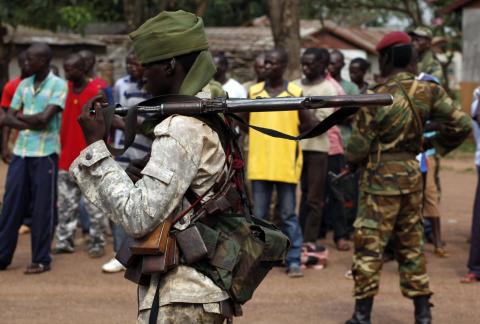Advertisement
French Troops Fight Central African Republic Gunmen In Capital
BANGUI (Reuters) - French troops fought gunmen in Bangui, the capital of Central African Republic, on Monday as they searched for weapons in an operation to disarm rival Muslim and Christian fighters responsible for hundreds of killings since last week.
Shooting erupted near the airport in the morning after gunmen refused to hand over their weapons, and French forces later came under attack by former rebels in the city center.
France said it was prepared to use force if fighters rejected calls to disarm or return to barracks.
Paris boosted its military presence to 1,600 troops at the weekend as waves of religious violence swept its former colony.
A U.S. official said the Pentagon had received requests for logistical support to bolster operations by France and African Union peacekeepers, and was likely to provide some assistance.
The official told Reuters this could resemble the help the Pentagon gave France during its campaign against al Qaeda-linked Islamists in Mali this year. That included airlift capacity and intelligence sharing.
At least 459 people have been killed in Bangui alone since Thursday, according to Red Cross officials.
"This is not an easy job but our soldiers are well prepared," French Foreign Minister Laurent Fabius told France Inter radio. Orders to disarm were aired on local radio. "If that is not enough, force is going to be employed," he said.
Central African Republic has spiraled into chaos since mainly Muslim Seleka rebels seized power in March and embarked on months of looting, raping and killing. Seleka's leader, Michel Djotodia, installed as the interim president, has lost control of his loose band of fighters.
The International Criminal Court's chief prosecutor said any party involved in the violence could be prosecuted.
CLASHES
Christian militias and gunmen loyal to ousted president Francois Bozize attacked Bangui on Thursday, the same day the U.N. Security Council authorized France to use lethal force to help African peacekeepers already struggling to restore order.
In an early test of France's resolve, its troops traded fire with gunmen near the airport on Monday morning. A French army spokesman in Paris called the incident "insignificant".
"Many armed elements who held positions in Bangui have left their positions to go back to their barracks," Colonel Gilles Jaron said.
However, French troops again came under attack later in the day in the PK 5 neighborhood, from suspected Seleka fighters.
"It was an attempt to intimidate. We responded with 20mm cannon, then sent in a platoon to carry out clean-up operations," said Captain Guillaume Fresse, spokesman for the French force in Bangui.
It was not immediately known whether there had been casualties in the two incidents.
With French forces on checkpoints and on patrol, crowd violence erupted in several districts of Bangui.
In the Castor neighborhood, a Reuters reporter saw a crowd attack a man they accused of being a disarmed Seleka fighter after French soldiers removed weapons from a house there, then left.
Other Seleka fighters let themselves be disarmed without resistance, sometimes watched by applauding crowds.
At a mosque in the PK 5 neighborhood, the resident imam showed journalists the bodies of two men who he said had been beaten to death by Christians.
French troops have been broadly welcomed in a city struggling to emerge from a period that saw fighters, both Christian and Muslim, go door-to-door killing civilians.
SHOPS REOPEN
As French warplanes and helicopters flew low overhead, residents reappeared on the streets and some shops and market stalls reopened for the first time since last week.
"Yesterday we couldn't even come here to cross this road because the Seleka came and set up a base here," said a woman who gave her name only as Armelle. "Thank God the French came. If there's peace, things will get better."
However, the United Nations said it had counted some 72,000 people displaced by the violence staying in various sites in Bangui, including at the airport, where French troops and African peacekeepers have their base.
"There are still conflicts in some neighborhoods. There's still killing," said Amy Martin, head of the U.N. aid agency OCHA in Bangui. "For now, we don't have the feeling that people are ready to go home.
Meanwhile information began to trickle in from parts of the country cut off from the capital since last week.
A humanitarian worker in the town of Bossangoa said the number of dead there from several days of violence between Seleka and Christian "anti-balaka" militias had risen to 38.
In Bozoum, in the northwest, U.N. officials received reports of dozens of dead, and there was also violence in the nearby town of Bocaranga.
Humanitarian agencies and rights groups said the figures reflected only bodies officially counted, and the final toll was likely to be much higher.
"We've spoken to a lot of people who have just buried their relatives in the back yard because they couldn't get out or didn't see the point of calling the Red Cross," said Joanna Mariner, a crisis expert with Amnesty International in Bangui.
(Additional reporting by Marine Pennetier, Joe Bavier, Bate Felix and Phil Stewart; Writing by Matthew Mpoke Bigg; Editing by)



















Add new comment